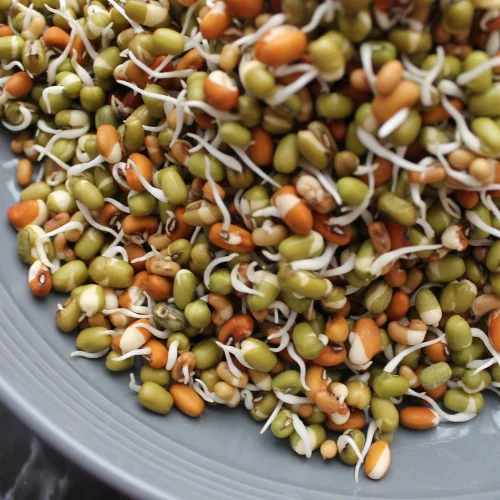Best Foods for Dementia Patients to Eat
As we age, our bodies undergo changes that affect various aspects of our lives, including our cognitive abilities. Dementia is a common condition that affects many people in their old age, and it can be a challenging condition to manage. However, one thing that we can do to help manage dementia is to pay attention to our diets. In this post, I will be discussing the best foods for dementia patients to eat.
Here are the 6 best foods for dementia patients to eat
1. Whole Foods

The first type of food that dementia patients should focus on is whole foods. These are foods that are minimally processed and as close to their natural state as possible. Whole foods are rich in nutrients and have many health benefits. They are also easier for the body to digest, which means that the body can absorb the nutrients more efficiently.
Some examples of whole foods include fruits, vegetables, whole grains, nuts, and seeds. These foods are rich in vitamins, minerals, and antioxidants that are important for brain health. Eating a diet rich in whole foods can help improve cognitive function, memory, and overall brain health.
2. Omega-3 Fatty Acids

Omega-3 fatty acids are essential nutrients that are important for brain health. These fatty acids play a key role in the structure and function of brain cells. They also have anti-inflammatory properties, which can help to reduce the risk of dementia.
Some examples of foods that are high in omega-3 fatty acids include fatty fish like salmon, tuna, and sardines, as well as flaxseed, chia seeds, and walnuts. These foods can help to improve memory and cognitive function in people with dementia.
3. Antioxidants

Antioxidants are compounds that help to protect the body from oxidative stress, which can damage cells and contribute to the development of dementia. Eating a diet that is rich in antioxidants can help to reduce the risk of dementia and improve cognitive function in people who already have the condition.
Some examples of foods that are high in antioxidants include berries, dark chocolate, spinach, kale, and other leafy greens. These foods are also rich in other nutrients that are important for brain health, such as vitamin C, vitamin E, and folate.
4. Low-Glycemic Foods

Low-glycemic foods are foods that don’t cause a rapid increase in blood sugar levels. These foods are important for people with dementia because high blood sugar levels can contribute to the development of cognitive problems.
Some examples of low-glycemic foods include whole grains, legumes, nuts, and seeds. These foods are rich in fiber, which helps to slow down the absorption of sugar in the bloodstream. Eating a diet that is rich in low-glycemic foods can help to improve cognitive function and reduce the risk of dementia.
5. Vitamin D
Vitamin D is an essential nutrient that plays a key role in many bodily functions, including brain health. Vitamin D helps to regulate the immune system and reduce inflammation, which can contribute to the development of dementia.
Some examples of foods that are high in vitamin D include fatty fish like salmon, tuna, and mackerel, as well as fortified foods like milk, orange juice, and cereal. Getting enough vitamin D can help to improve cognitive function and reduce the risk of dementia.
6. Water

Drinking enough water is important for everyone, but it’s especially important for people with dementia. Dehydration can cause confusion and other cognitive problems, so it’s important to stay hydrated.
Some people with dementia may have difficulty remembering to drink water, so it’s important to encourage them to drink regularly throughout the day. Adding fruits like lemon, cucumber, or mint to water can make it more appealing.
What does the research say?
In this study, researchers looked at how what we eat can affect our chances of getting Alzheimer’s disease, which is a type of dementia that makes you forget things and affects your thinking.
They found that as people get older, they are more likely to get sick, and a lot of these sicknesses are really bad for our brains. Alzheimer’s is one of the worst brain sicknesses, and there’s no cure for it yet. So, scientists are trying to figure out how we can stop it before it even starts.
They discovered that if we eat the right stuff when we’re around 50 years old, we might be able to protect our brains for a longer time. Imagine it like this: when you’re 50, your brain, the way you eat, and how your body works are all in a kind of balance. If you eat well, it helps keep everything in check and makes it more likely you’ll stay healthy in the long run.
Now, the good news is that certain types of food can really help. Foods like fruits, vegetables, and fish (especially the kind with omega-3 fats) are like brain superheroes. They can fight off the bad stuff that can cause Alzheimer’s. Think of them as the “good guys” in your diet.
But there are also “bad guys” in our food. Things like saturated fats and some proteins can actually make Alzheimer’s worse. So, if you eat a lot of these “bad guy” foods, it’s like giving your brain a hard time and making it more likely to get sick.
The researchers also mentioned some special nutrients that are like secret weapons against Alzheimer’s. Things like vitamins B6 and B12, along with some other special substances, can help protect your brain.
Now, they also talked about diets like the Mediterranean and DASH diets. These diets are like special meal plans that are really good for your brain. Imagine them as the “super diets” that can save the day. But there’s also a new diet called the MIND diet, and it seems to be even better at keeping your brain sharp and preventing Alzheimer’s compared to the other two.
So, in simple terms, what you eat when you’re around 50 can either help or harm your brain. Eating lots of brain-boosting foods and following a good diet like the MIND diet can be your brain’s best friend, helping you stay sharp and avoid Alzheimer’s disease for as long as possible.
What types of whole foods are best for dementia patients?
One of the most beneficial whole foods for dementia patients is fatty fish, such as salmon and mackerel. These types of fish are rich in omega-3 fatty acids, which have been shown to improve brain function and memory. In addition, they contain protein and vitamin D, which are essential for maintaining overall health and well-being.
Another whole food that is excellent for dementia patients is leafy greens. These include kale, spinach, and collard greens, which are packed with nutrients such as folate, vitamin E, and vitamin K. These nutrients have been shown to protect against cognitive decline and improve brain function.
Berries are also a great choice for dementia patients. Blueberries, in particular, are rich in anthocyanins, which are antioxidants that have been shown to improve cognitive function and memory. Other types of berries, such as strawberries and raspberries, are also high in antioxidants and can help to protect against age-related cognitive decline.
Nuts and seeds are another whole food that is beneficial for dementia patients. They are rich in healthy fats, protein, and fiber, which can help to improve brain function and prevent cognitive decline. Walnuts, in particular, are high in omega-3 fatty acids, which are essential for brain health.
Finally, whole grains such as quinoa, brown rice, and oatmeal are an excellent choice for dementia patients. They are rich in fiber, vitamins, and minerals, which can help to improve cognitive function and protect against age-related cognitive decline.
How much omega-3 fatty acids should dementia patients consume?
Omega-3 fatty acids are essential fatty acids that are necessary for the proper functioning of the body and brain. They are found in fatty fish such as salmon, mackerel, and tuna, as well as in nuts and seeds. The two main types of omega-3 fatty acids are EPA (eicosapentaenoic acid) and DHA (docosahexaenoic acid).
Studies have shown that consuming at least 500 milligrams of EPA and DHA per day can help to improve cognitive function and slow the progression of dementia. This amount can be obtained by consuming two servings of fatty fish per week or by taking omega-3 supplements.
It is important to note that while omega-3 fatty acids are beneficial for dementia patients, it is essential to consult with a healthcare professional before starting any new supplement or dietary regimen. This is especially true for individuals who are taking blood thinners, as omega-3 fatty acids can have a blood-thinning effect.
In addition to consuming omega-3 fatty acids, dementia patients should also follow a healthy and balanced diet that includes a variety of whole foods such as leafy greens, berries, nuts and seeds, and whole grains. Regular exercise and adequate sleep are also important for maintaining cognitive function and overall health.
What are some examples of low-glycemic foods that are good for dementia patients?
Firstly, let us define what low-glycemic foods are. The glycemic index (GI) is a measure of how quickly carbohydrates in food are broken down into glucose and absorbed into the bloodstream. Foods with a high GI can cause a rapid rise in blood sugar levels, which can lead to inflammation and damage to the brain over time. On the other hand, low-glycemic foods are absorbed more slowly and can help to maintain stable blood sugar levels.
Here are some examples of low-glycemic foods that are good for dementia patients:
Leafy greens

Kale, spinach, and other leafy greens are low in carbohydrates and high in antioxidants, which can help to protect the brain from damage. They are also rich in vitamins and minerals that are essential for maintaining cognitive function.
Berries
Blueberries, strawberries, and other berries are low in sugar and high in antioxidants and fiber. Berries have been found to improve cognitive function and slow down the progression of dementia.
Nuts and seeds

Almonds, walnuts, chia seeds, and flaxseeds are low in carbohydrates and high in healthy fats and fiber. They are a good source of energy for the brain and help to maintain stable blood sugar levels.
Whole grains
Brown rice, quinoa, and other whole grains are low in carbohydrates and high in fiber. Whole grains are a good source of complex carbohydrates that are broken down slowly and provide a steady supply of energy to the brain.
Legumes

Lentils, chickpeas, and other legumes are low in carbohydrates and high in protein and fiber. They help to maintain stable blood sugar levels and provide the brain with essential nutrients that help to maintain cognitive function.
In addition to consuming low-glycemic foods, dementia patients should also avoid processed and refined foods, which are often high in sugar and can lead to inflammation and damage to the brain over time. They should also limit their intake of saturated and trans fats, which can increase the risk of developing dementia.
Are there any specific types of antioxidants that are particularly beneficial for cognitive function?
Antioxidants are compounds that protect the body’s cells from damage caused by free radicals, which are unstable molecules that can lead to oxidative stress and damage. Oxidative stress has been linked to several chronic diseases, including Alzheimer’s disease, Parkinson’s disease, and other forms of cognitive decline. Antioxidants can help to prevent or reduce the damage caused by oxidative stress, but are there any specific types of antioxidants that are particularly beneficial for cognitive function?
Research suggests that certain types of antioxidants may have a greater impact on cognitive function than others. One such antioxidant is flavonoids, which are naturally occurring compounds found in fruits, vegetables, and other plant-based foods. Flavonoids have been shown to improve cognitive function, particularly in the areas of memory and attention.
Another type of antioxidant that may be beneficial for cognitive function is vitamin E. Vitamin E is a fat-soluble vitamin that acts as an antioxidant in the body, protecting cell membranes from oxidative damage. Studies have shown that vitamin E supplementation may improve cognitive function in older adults with mild cognitive impairment.
Omega-3 fatty acids are another type of nutrient that may have antioxidant properties and be beneficial for cognitive function. Omega-3 fatty acids are found in fatty fish, such as salmon, as well as in plant-based sources such as flaxseed and chia seeds. Studies have shown that omega-3 supplementation may improve cognitive function in healthy adults, as well as in individuals with mild cognitive impairment and Alzheimer’s disease.
Resveratrol is another antioxidant that has been linked to improved cognitive function. Resveratrol is found in grapes, red wine, and other plant-based sources, and has been shown to have neuroprotective properties. Studies have suggested that resveratrol may improve memory and cognitive function, as well as have potential as a treatment for Alzheimer’s disease.
How can caregivers modify the texture of foods to make them easier for dementia patients to swallow?
Dementia can make it difficult for individuals to swallow food safely and comfortably, putting them at risk of choking and aspiration. Caregivers can modify the texture of foods to make them easier for dementia patients to swallow, while still providing them with adequate nutrition. Here are some tips and techniques for modifying food texture:
Pureeing

Foods can be pureed in a blender or food processor to create a smooth, uniform texture. This is especially useful for fruits, vegetables, and proteins such as chicken or fish. Pureed foods can be served alone or added to soups and stews for added nutrition.
Mashing

Soft foods such as potatoes, sweet potatoes, and bananas can be mashed with a fork or potato masher to create a texture that is easier to swallow.
Thickening
Liquid foods such as soups and beverages can be thickened with commercial thickeners or with natural thickeners such as pureed fruits or vegetables. Thicker foods are easier to swallow and less likely to cause aspiration.
Chopping
Foods can be chopped into smaller, bite-sized pieces to make them easier to manage in the mouth. This technique is especially useful for raw vegetables and fruits.
Softening
Foods can be cooked until they are soft and tender, making them easier to chew and swallow. This technique works well for proteins such as meat, which can be cooked until they are fall-apart tender.
Adding moisture
Foods can be moistened with broth, sauce, or gravy to make them easier to swallow. This is especially useful for dry or tough foods such as bread or chicken.
It’s important to note that not all foods can be modified in the same way. Some foods may need to be changed using a combination of techniques to achieve the desired texture. It’s also important to consider the individual’s preferences and dietary restrictions when modifying food texture.
In addition to modifying food texture, caregivers can also take steps to ensure safe swallowing, such as sitting the individual upright during meals, providing small, frequent meals throughout the day, and avoiding distractions such as loud music or television during mealtime.
Conclusion
Eating a healthy and balanced diet is an integral part of managing dementia. Whole foods, omega-3 fatty acids, antioxidants, low-glycemic foods, vitamin D, and water are all important components of a dementia-friendly diet.
It’s important to work with a healthcare professional to develop a personalized nutrition plan that takes into account the individual’s unique nutritional needs and preferences.
At the end of the day, the most important thing is to provide comfort and support to those with dementia. Mealtimes can be an opportunity to connect and provide a sense of familiarity and routine. Encourage your loved one to eat slowly and enjoy their food, and provide a relaxed and comfortable environment during mealtimes.
Do you have experience caring for a loved one with dementia? What dietary strategies have you found helpful in managing their symptoms? Share your thoughts and experiences in the comments section below.

